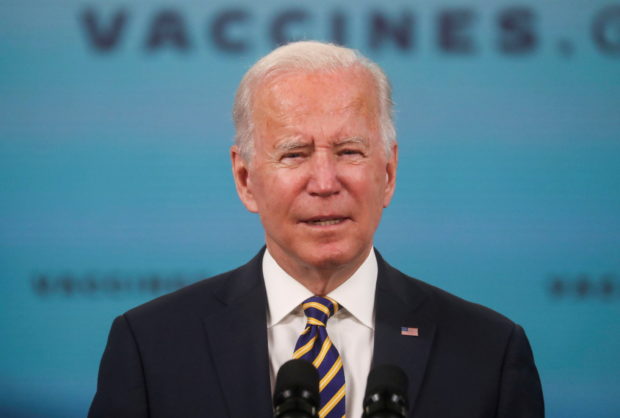
FILE PHOTO: U.S. President Joe Biden delivers an update on the administration’s coronavirus disease (COVID-19) response and the vaccination program during remarks at the White House in Washington, U.S., October 14, 2021. REUTERS/Leah Millis
WASHINGTON — U.S. President Joe Biden and Democratic lawmakers are edging toward a deal on the scope of their cornerstone economic revival package and hope to reach a compromise as soon as this week, people briefed on the negotiations said on Tuesday.
Scrambling to broker an agreement, Biden met with 19 lawmakers on Tuesday, an unusually busy day of legislative negotiations. He aimed to secure what may be the signature effort of his administration, a multitrillion-dollar, two-bill legislative package that expands social safety net programs and infrastructure spending.
One source said a deal could be announced midweek if things go well; two others said the White House was hoping for an announcement in coming days.
A spending package that was originally estimated at $3.5 trillion over a decade could be $1.9 trillion to $2.2 trillion, said Representative Pramila Jayapal, chair of the Progressive Caucus in the House of Representatives, after meeting with Biden.
Senate Majority Leader Chuck Schumer also said Democrats aim to reach a framework deal this week. Speaking to reporters following a closed-door lunch with fellow Democrats, he said: “There was universal agreement in that room that we have to come to an agreement and we want to get it done this week.”
Any final deal is likely to severely curtail Biden’s initial ambition. Initiatives in his original proposal that may see cuts include $322 billion for affordable housing, money for paid family leave and some $400 billion earmarked to increase home-based care for the elderly and disabled, according to a person familiar with the matter.
Biden has told lawmakers that a program providing free community college is on the chopping block and a child tax credit may be extended for fewer years than planned, according to people familiar with the discussions.
All of the people warned that negotiations were fragile, still under way and that a deal could still collapse.
U.S. House of Representatives Speaker Nancy Pelosi has set Oct. 31 as the deadline for the House to pass a $1.2 trillion infrastructure deal that the Senate has already approved and has broad bipartisan support.
As part of the blitz of meetings that tested his negotiating skills honed over decades in Congress, Biden met on Tuesday with a group of House progressive lawmakers, which has been unwilling to pass the infrastructure bill unless it is coupled with the larger budget bill that would fund Biden’s campaign pledges on climate, inequality and social programs.
“We all feel still even more optimistic about getting to an agreement,” to get a large measure of what they wanted months ago, said Jayapal, who attended the meeting.
She said there still weren’t “final” details on major portions of the initiative, including on climate change.
White House spokeswoman Jen Psaki said the various factions are “coming closer to a path forward.”
The president met on Tuesday morning with moderate Democratic senators Joe Manchin and Kyrsten Sinema, who have voiced concern about the size of the bill and pushed Biden to reduce the original cost. They have a virtual veto over his agenda because both chambers of Congress are controlled only narrowly by Democrats. Republicans largely oppose the larger social-spending bill.
Asked about the size of the spending bill, Manchin yelled, “I’m at $1.5” trillion to reporters in Congress on Tuesday evening.
One of Biden’s major selling points in last year’s presidential campaign was his ability to find a middle ground at a time of deep political polarization, touting his 36 years as a moderate Democratic U.S. senator from Delaware.
Weeks of negotiations, which White House officials say have been productive, have nonetheless failed to bridge the gap on the spending bill. Biden said on Oct. 1 that he would find an agreement “whether it’s in six minutes, six days or in six weeks,” but White House officials are increasingly concerned as the weeks tick by.
Manchin, the West Virginia senator, said on Tuesday he is not talking about a carbon tax in negotiations over the spending and infrastructure bills, even as some of his fellow Democrats in the Senate support it as a way to fight climate change.